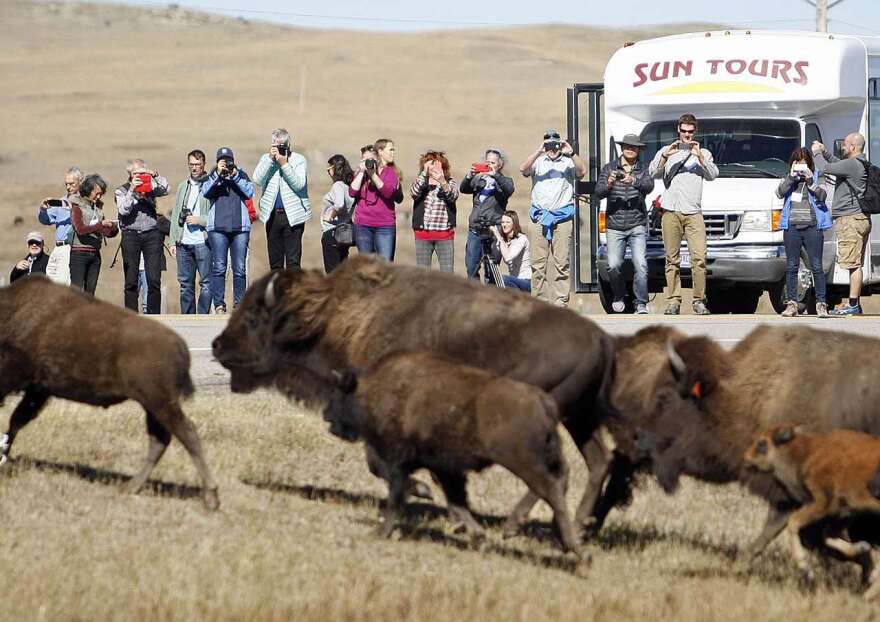Most of the 50 people visiting Waterton-Glacier International Peace Park for a workshop this week have never seen a bison. They flew in from as far away as South Africa, Russia and Iran to learn about ways countries can work together to manage wildlife, rivers, reefs and landscapes.
Representatives of nearly 30 international projects across 70 countries and indigenous territories are taking part in the three-day workshop hosted by Waterton-Glacier International Peace Park. On Wednesday, they went on a field trip to the Blackfeet Reservation to see the early stages of a cooperative management program in action here.
The Blackfeet Nation is working to restore bison to the species’ native range, which extends beyond the boundaries of their reservation into Glacier National Park and the nearby Badger-Two Medicine area on National Forest land.
"So here's the thing: You cannot care about buffalo and not care about the buffalo people."
Leona Tracey is the field program coordinator for the Innii Initiative, the tribe’s bison program. The tribe wants bison back on the landscape for food independence, ecological conservation and maintaining tradition.

For the past 8 years, the tribe has worked with the Wildlife Conservation Society, Glacier National Park, Parks Canada and the Blackfoot Confederacy to design a management program.
Tracey told the international conservationists about how important bison are to the Blackfeet people, emphasizing the need for different agencies to work together.
"Us tribal people, we can't do it all by ourselves. We probably can, but it might take a lot longer, but if we can get all the rest of you to help us, it's something we can see."
The Innii Initiative is just one example the cooperative management across political borders Glacier National Park is known for, says park superintendent Jeff Mow.
"If there's one thing Glacier brings to the National Park Service with regards to what's unique about each park, I think it's the fact that it's the world's first International Peace Park."
That designation formally recognized friendship between Canada and the United States in 1932. Since then, Glacier and its neighbor to the north — Waterton Lakes National Park — have agreed to cooperate in managing and researching grizzly bears. More recently, the parks have been working together to become the first multi-nation Dark Sky Preserve.
Mow says the Innii Initiative is another way the park can partner with its neighbors to better manage wildlife and ecosystems.
"It's really going to this next level, I'd say almost transformational level, of how we manage a resource or important issue, like restoring bison habitat."
Mow echoes Leona Tracey — saying his agency can’t do it alone. The park only has about 100,000 acres of suitable bison habitat — the best winter range is on the Blackfeet Reservation. To maintain a healthy herd, both groups will have to balance their autonomous control with working together.
Each of the projects represented at the workshop are really different, and there’s no common roadmap for how to create them.
Andrew Dunn works for the Wildlife Conservation Society in Africa. He says learning about the Innii Initiative provides a model for work he’s doing to protect the cross river gorilla.

"I've really enjoyed this today, being out in the sun and just listening to the story of the buffalo and the story of the American Indians taking control of their land and their health issues. I've been fascinated by this today."
The cross river gorilla is a critically endangered species that only lives on the border between Nigeria and Cameroon. The two countries got into a border war over oil in the 1990s. Dunn thinks conservation across borders is one way to restore peace.
"So it was a lot of mistrust built over years, so people wouldn't really meet. So trans-boundary conservation is one way of bringing people together from both sides of the border to meet and talk about an issue of common interest. And if you do that over a few years, you meet every 6 months or 12 months, it gradually builds up trust and personal relationships, and I think it helps break down barriers."
The trans-boundary summit piggybacks the annual week-long Hands Across Borders celebration, which recognizes the Rotary Club’s contribution to environmental peacemaking.
[Editors note, 09/19/16: Some references to "Glacier National Park were changed to "Waterton-Glacier International Peace Park"]


